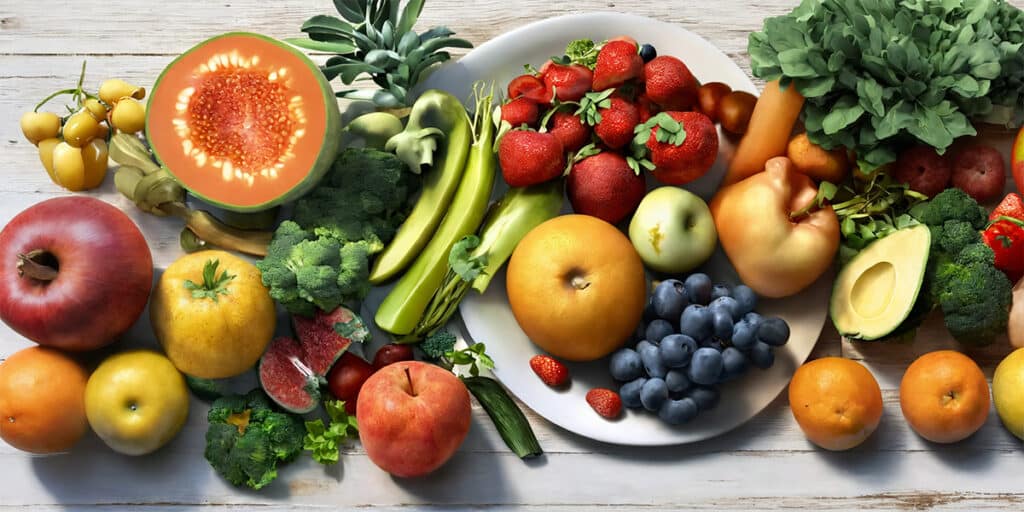Inflammation is a silent adversary to oral health, particularly in the senior population. It can pave the way for serious dental issues, including gum disease, which, if left unchecked, may lead to tooth loss and other health complications. However, the power of a well-chosen diet can be a formidable shield in protecting your smile.
This guide delves into the top foods known for their inflammation-fighting properties and their role in bolstering oral health for seniors
Unlocking the Secrets to Oral Wellness Through Diet
A balanced diet does more than nourish the body; it’s a critical line of defense against oral health issues.
- Certain foods offer anti-inflammatory benefits, crucial for preventing gum disease.
- Others are rich in vitamins and minerals that strengthen teeth and gums from within.
Best Foods for Maintaining Oral Health
Crunch Time: The Benefits of Raw Vegetables
Raw vegetables are not only nutritional powerhouses but also natural toothbrushes for your oral cavity. Their crunchy texture helps clean teeth and massage gums, promoting blood circulation and reducing the risk of gum disease.
Carrots and Celery: These vegetables act as natural abrasives, scrubbing plaque and food particles from your teeth while you chew. Their fibrous nature helps stimulate saliva production, a natural cleanser for the mouth.
Leafy Greens: Kale, spinach, and Swiss chard are loaded with calcium, which builds your teeth’s enamel. They also contain folic acid, a type of B vitamin that has numerous health benefits, including potentially treating gum disease in pregnant women.
Apples: Eating apples can increase saliva production, which reduces tooth decay by lowering the levels of bacteria in the mouth. They’re not a substitute for brushing, but an apple a day can help keep the dentist away.
Dairy and Its Double Duty
Dairy products offer a unique combination of calcium, phosphate, and probiotics, essential for protecting the enamel on your teeth and balancing the mouth’s pH levels.
Cheese: It’s rich in calcium and phosphate, which strengthen teeth, plus it boosts saliva production. Saliva is crucial for washing away acidic residues from foods and drinks. Cheese also contains casein, a protein that plays a role in stabilizing and repairing enamel.
Yogurt: The probiotics (beneficial bacteria) found in yogurt help keep your mouth healthy by displacing bad bacteria that can cause cavities and gum disease. Opt for plain yogurts with no added sugar for the best benefits.
Milk: Drinking milk can help reduce the effects of acidic foods and beverages and helps rebuild tooth enamel with its high calcium and phosphate content.
The Power of Polyphenols
Polyphenols, found in a variety of foods, offer protective properties that are especially beneficial for oral health. They work to reduce inflammation, inhibit plaque formation, and fight bacteria, all without disrupting the balance of beneficial bacteria in your mouth.
Tea: Both green and black teas are abundant in polyphenols. They have been shown to slow the growth of bacteria associated with cavities and gum disease. Tea also affects the adhesiveness of bacteria, making it harder for them to stick to tooth surfaces. Just remember, moderation is key, as tea can also stain teeth over time.
Berries: Blueberries, raspberries, strawberries, and blackberries are not just delicious; they’re also packed with polyphenols. These fruits can reduce inflammation and prevent the attachment and growth of plaque-causing bacteria in the mouth. Adding berries to your diet is a sweet way to boost your oral health.
Nuts and Seeds: Almonds, flaxseeds, and sunflower seeds are excellent sources of polyphenols, as well as calcium and phosphate, which help repair tooth enamel. Nuts and seeds also stimulate saliva production, further protecting your teeth from decay.
Incorporating these polyphenol-rich foods into your daily diet can significantly contribute to the health of your teeth and gums, showcasing the profound impact of dietary choices on oral wellness.
Omega-3: The Unsung Hero of Gum Health
Often celebrated for its heart health benefits, omega-3 fatty acid is a critical but underappreciated ally in maintaining gum health. Found abundantly in fatty fish like salmon, mackerel, and sardines, omega-3 is lauded for its potent anti-inflammatory properties. These properties are especially beneficial in combating periodontitis, a serious gum infection that can lead to tooth loss and other health complications if untreated. Regular consumption of omega-3-rich foods can help soothe inflamed gum tissues, reducing the severity of periodontitis and even preventing its onset.
Vitamin C: More Than Just a Cold Remedy
Vitamin C plays a pivotal role beyond bolstering the immune system; it’s vital for strong gums and the prevention of gum disease. This essential nutrient aids in the production of collagen, a protein that maintains and repairs the gums and other soft tissues in the mouth. A deficiency in vitamin C can lead to weakened gums, making them more susceptible to gingivitis and gum disease.
Citrus Fruits: While citrus fruits like oranges, lemons, and grapefruits are rich sources of vitamin C, their high acid content can erode tooth enamel over time. It’s important to consume these in moderation and rinse the mouth with water after eating them to neutralize the acids.
Peppers and Broccoli: For those looking to minimize acid intake while boosting vitamin C, bell peppers and broccoli are excellent alternatives. These vegetables offer the dual benefits of high vitamin C content and lower acidity, supporting gum health without the risk of enamel erosion.
Water: The Ultimate Mouth Cleanser
Hydration is a cornerstone of oral health. Water isn’t just vital for bodily functions; it’s also the best drink for maintaining a healthy mouth. Drinking water promotes saliva production, which is essential for washing away food residues and bacteria, neutralizing mouth acids, and preventing dry mouth—a condition that can increase the risk of tooth decay and gum disease. Ensuring adequate water intake is a simple yet effective step toward preserving both oral and overall health.
| Food Type | Nutrient | Oral Health Benefit | Recommended Serving |
|---|---|---|---|
| Leafy Greens | Calcium, Folic Acid | Strengthens enamel, Gum health | 1-2 cups daily |
| Fatty Fish (e.g., Salmon) | Omega-3 Fatty Acids | Reduces gum inflammation | 2-3 servings per week |
| Dairy Products | Calcium, Phosphate | Restores mineral content, Neutralizes acids | 2-3 servings daily |
| Nuts and Seeds | Polyphenols, Minerals | Combat bacteria, Rebuild enamel | Small handful daily |
| Water | – | Hydrates mouth, Cleanses bacteria | 8-10 glasses daily |
Navigating Supplements for Oral Health
A well-rounded diet rich in vitamins, minerals, and nutrients is foundational for maintaining optimal oral health. However, it’s not always possible to meet all your nutritional needs through food alone, especially in the face of dietary restrictions, health conditions, or age-related absorption issues. This is where supplements can play a crucial role, serving as a valuable tool to fill in the nutritional gaps.
When considering supplements for oral health, focus on those that offer key benefits for your teeth and gums:
Calcium and Vitamin D: Essential for bone health, including your jawbone and teeth structure. Vitamin D enhances calcium absorption, making this duo a powerful combination for oral health.
Omega-3 Fatty Acids: Supplements such as fish oil can offer the anti-inflammatory benefits needed to combat gum disease, especially for those who don’t consume enough fatty fish.
Vitamin C: A supplement that can bolster the health of your gums and soft tissues in your mouth, particularly beneficial for individuals who have difficulty consuming enough fruits and vegetables.
It’s important to consult with a healthcare provider before starting any supplement regimen, ensuring that it aligns with your specific health needs and conditions.
Best Practices for Incorporating These Foods into Your Diet
Adopting a diet that benefits your oral health involves more than just knowing which foods to eat. It’s about integrating these foods into your daily life in a way that’s sustainable and enjoyable. Here are some strategies to help you make these dietary changes a lasting part of your routine:
Plan Your Meals: Incorporate foods rich in vitamins, minerals, and nutrients into your weekly meal plan. Ensuring you have ingredients on hand for balanced meals will make it easier to maintain these dietary habits.
Creative Cooking: Explore new recipes that make the most of oral health-friendly foods. This can keep your diet interesting and encourage you to stick to these healthier options.
Snack Smart: Choose snacks that contribute to your oral health, such as crisp vegetables, nuts, and cheese. These can satisfy your hunger while also benefiting your teeth and gums.
Hydrate Often: Make water your drink of choice. Keeping a water bottle with you throughout the day can remind you to stay hydrated, supporting saliva production and overall oral health.
Supplement Wisely: For nutrients that are challenging to get from your diet alone, consider supplements as a backup. They can ensure you’re getting the full spectrum of nutrients needed for strong teeth and healthy gums.
Essential Insights for Optimal Oral Health
As we journey through the exploration of how diet influences oral health, particularly for seniors, it becomes clear that our eating habits play a pivotal role in maintaining the health of our teeth and gums. Here are the key takeaways to ensure that the path to optimal oral health is both effective and sustainable:
Embrace Variety for Vitality
A diverse diet, rich in vitamins, minerals, and antioxidants, is fundamental to oral health. By incorporating a wide array of nutrient-dense foods—ranging from crunchy vegetables and lean proteins to healthy fats and dairy products—you provide your body with the essential elements it needs to fight inflammation, repair tissue, and strengthen teeth and bones. This variety not only nurtures your oral cavity but also enhances your overall nutritional intake, contributing to systemic health and well-being.
Moderation is Key
While certain foods are champions for oral health, moderation is essential. Foods with acidic properties, such as citrus fruits and tomatoes, can erode tooth enamel over time. Similarly, hard foods like nuts or seeds, though beneficial, can pose risks to teeth when consumed in excess or without care. The key is to enjoy these foods in moderation and practice diligent oral hygiene afterward—rinsing with water, brushing, and flossing—to mitigate any potential harm and keep your smile bright and healthy.
Consultation for Personalization
Individual dietary needs and health considerations can significantly influence what constitutes the ideal diet for oral health. Factors such as existing health conditions, dietary restrictions, allergies, and specific nutritional deficiencies make a one-size-fits-all approach impractical. Therefore, consulting with a healthcare provider or a nutritionist is invaluable. These professionals can offer personalized dietary advice tailored to your unique health profile, ensuring that your diet supports not only your oral health but also your overall health objectives.
By embracing these key insights—variety, moderation, and personalization—you equip yourself with the knowledge and strategies to maintain optimal oral health through diet. Remember, the foods you choose to eat have a profound impact not just on your oral health, but on your general health and quality of life. Armed with this understanding, you’re well on your way to supporting a healthy, vibrant smile that lasts a lifetime.
Top Foods for Oral Health to Fight Inflammation: Your FAQs Answered
What makes leafy greens good for oral health?
Their high calcium content strengthens enamel, while folic acid promotes gum health.
How do omega-3 fatty acids benefit the gums?
Omega-3s, especially from fatty fish, reduce inflammation, helping to prevent gum diseases like periodontitis.
Why are dairy products recommended for oral health?
They supply calcium and phosphate, vital for restoring tooth enamel and neutralizing mouth acids.
Can nuts and seeds actually benefit my teeth?
Yes, they contain minerals that rebuild enamel and polyphenols that fight mouth bacteria.
How does water contribute to oral hygiene?
Drinking water keeps the mouth hydrated, washes away food particles, and reduces bacteria.
Are citrus fruits bad for my teeth?
While rich in vitamin C, their acidity can erode enamel, so consume in moderation and rinse your mouth afterward.
Is tea good for oral health?
Yes, green and black teas contain polyphenols that reduce plaque bacteria. However, be mindful of potential staining.
Can sugar-free gum help my oral health?
Chewing sugar-free gum stimulates saliva production, which cleans the mouth and neutralizes acids.
What role does vitamin C play in oral health?
It strengthens gums and the soft tissues in your mouth, reducing the risk of gum disease.
How often should I eat these foods for optimal oral health?
Daily intake of these recommended foods, balanced with a varied diet, supports the best outcomes for oral health.
Citations
- “Relation between the food environment and oral health—systematic review” by Joreintje D Mackenbach, Elodie L Ibouanga, Monique H van der Veen, Kirsten A Ziesemer, Maria G M Pinho. This study systematically summarizes the available evidence on relations between the food environment and oral health outcomes in children and adults.
- “Dietary interventions and nutritional impact on oral health and development: a review” by S. N. Chandan & Santhosh Rao. This article touches upon certain salient aspects of nutrients and their bearing on overall oral health and development.
- “Editorial: Nutrition and oral biology in health and disease” from the journal Applied Sciences. This editorial discusses the importance of nutrition in maintaining oral health and preventing disease.
- “Grand challenges in oral health and nutrition: We are what we eat” from the journal Frontiers in Oral Health. This article discusses the challenges in understanding the complex relationship between oral health and nutrition.








